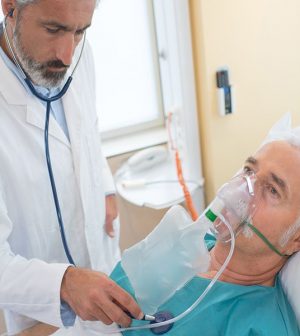- Recognizing the Signs of Hypothyroidism
- 10 Strategies to Overcome Insomnia
- Could Artificial Sweeteners Be Aging the Brain Faster?
- Techniques for Soothing Your Nervous System
- Does the Water in Your House Smell Funny? Here’s Why
- Can a Daily Dose of Apple Cider Vinegar Actually Aid Weight Loss?
- 6 Health Beverages That Can Actually Spike Your Blood Sugar
- Treatment Options for Social Anxiety Disorder
- Understanding the Connection Between Anxiety and Depression
- How Daily Prunes Can Influence Cholesterol and Inflammation
In Israel, Widespread Vaccination Slashes Severe COVID Cases in Older Patients

Israel is among the first nations in the world to have a majority of its citizens vaccinated against the new coronavirus. That effort may be already paying off, with rates of severe COVID-19 cases declining by two-thirds among Israelis over the age of 69, a new report finds.
“These findings provide preliminary evidence of the effectiveness of vaccines in preventing severe cases of COVID-19,” say public health researchers led by Yair Lewis, of Ben-Gurion University of the Negev in Beer-Sheva, Israel.
They report their findings Feb. 26 in Morbidity and Mortality Weekly Report, a journal of the U.S. Centers for Disease Control and Prevention.
With its 9 million people and highly organized, well-supplied COVID-19 vaccine rollout program, many see Israel as a harbinger of what’s to come for other, larger countries once vaccines have been delivered into the arms of most citizens.
Like other nations, Israel has been hit hard by SARS-CoV-2: More than 700,000 cases and 5,200 deaths had been reported as of Feb. 9, Lewis’ team said.
But beginning Dec. 20, Israel began a massive vaccination campaign, prioritizing older Israelis.
By early February, two doses of the highly effective Pfizer vaccine had been delivered to 84% of all Israelis age 70 and older, the research team said.
How is that success impacting the health of older Israelis?
To find out, Lewis’ group compared rates of severe, life-threatening COVID-19 (requiring use of a ventilator) in people over the age of 69 with that of patients aged at or under 50 years. By Feb. 9, only about 10% of these younger Israelis had gotten both doses of the Pfizer vaccine.
They report that in the fall — prior to the vaccine rollout — for every one COVID-19 patient under 50 with severe COVID-19, there were about six more aged 70 or older who were hooked up to the lifesaving machines.
But by Feb. 9, that ratio had dropped dramatically, so that for every 1 young patient with severe COVID-19, there were about 2 aged 70 or over. That’s a 67% drop overall.
And the hope is that as vaccines reach the bulk of younger Israelis, numbers of severe COVID-19 cases will continue to fall among all age groups.
Lewis’ group stressed that it took more than just vaccines to keep SARS-CoV-2 transmission down.
“Non-pharmaceutical interventions have included three national stay-at-home orders, multiple rounds of school closures, restrictions on commercial activity and travel, and a mask mandate, among others,” Lewis’ group noted.
But the Pfizer vaccine’s high effectiveness has also been key. Indeed, on Feb. 19, Pfizer said its latest data — from 9,000 employees at Israel’s largest hospital — suggests that just one dose of its vaccine may provide 85% protection against SARS-CoV-2.
More information:
There’s more on COVID-19 vaccination at the CDC.
SOURCE: Morbidity and Mortality Weekly Report, Feb. 26, 2021
Source: HealthDay
Copyright © 2026 HealthDay. All rights reserved.










